In this edition:
- MESAT1 Designated MESAT1-OSCAR 122 (MO-122)
- ARISS Slow Scan TV Transmissions Begin Tuesday
- SDRplay Announces the nRSP-ST Networked Receiver
- VUCC Satellite Standing October 2024
- Changes to AMSAT-NA TLE Distribution for October 4, 2024
- ARISS News
- Upcoming Satellite Operations
- AMSAT Ambassador Activities
- Satellite Shorts From All Over
The AMSAT News Service bulletins are a free, weekly news and information service of AMSAT, the Radio Amateur Satellite Corporation. ANS publishes news related to Amateur Radio in Space including reports on the activities of a worldwide group of Amateur Radio operators who share an active interest in designing, building, launching and communicating through analog and digital Amateur Radio satellites.
The news feed on http://www.amsat.org publishes news of Amateur Radio in Space as soon as our volunteers can post it.
Please send any amateur satellite news or reports to: ans-editor [at] amsat [dot] org.
You can sign up for free e-mail delivery of the AMSAT News Service Bulletins via the ANS List; to join this list see: https://mailman.amsat.org/postorius/lists/ans.amsat.org/
ANS-280 AMSAT News Service Weekly Bulletins
To: All RADIO AMATEURS
From: Radio Amateur Satellite Corporation
712 H Street NE, Suite 1653
Washington, DC 20002
DATE 2024 OCT 06
MESAT1 Designated MESAT1-OSCAR 122 (MO-122)
On July 4, 2024 at 04:04 UTC, the MESAT1 satellite was launched on a Firefly Alpha launch vehicle from Vandenberg Space Force Base in California. Developed by the University of Maine, the satellite carries an earth imaging experiment and an AMSAT-provided LTM-1 linear transponder to provide services to amateur radio enthusiasts around the world. The satellite has been commissioned and the transponder is currently active.
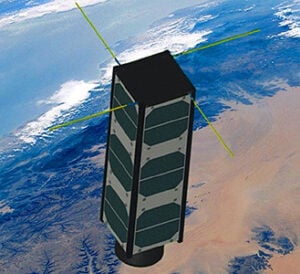
At the request of University of Maine, AMSAT hereby designates MESAT1 as MESAT1-OSCAR 122 (MO-122). We congratulate the University of Maine, thank them for their contribution to the amateur satellite community, and wish them continued success on this and future projects.
[ANS thanks Drew Glasbrenner, KO4MA, AMSAT VP – Operations and OSCAR Number Administrator, for the above information]
The 2024 AMSAT President’s Club coins are here now!
Help Support GOLF and Fox Plus
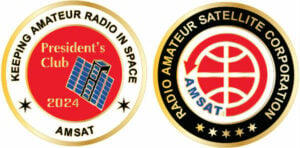
Join the AMSAT President’s Club today and help
Keep Amateur Radio in Space!
https://www.amsat.org/join-the-amsat-presidents-club/
ARISS Slow Scan TV Transmissions Begin Tuesday
ARISS is planning a Slow Scan Television (SSTV) experiment from the International Space Station, scheduled to start on Tuesday, October 8, at 16:00 GMT and running until Monday, October 14, at 14:10 GMT.
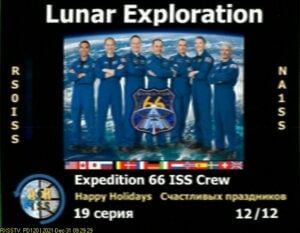
There will be an interruption on Friday, October 11, for planned school contacts over Europe.
The transmission frequency will be 145.800 MHz FM, using SSTV mode PD120. The ISS callsign will be RS0ISS.
The SSTV transmissions will be made using the station in the Russian ISS Service Module. The equipment used is a Kenwood D710 transceiver running about 25 watts output which provides a very strong signal enabling reception using simple equipment. Images received by amateurs world-wide during previous transmissions can be seen at http://www.spaceflightsoftware.com/ARISS_SSTV.
Amateurs can receive the SSTV pictures directly from the space station by connecting the audio output of their two-meter transceiver via a simple interface to the soundcard on a Windows PC or an Apple iOS device. On Windows PC’s the free application MMSSTV can be used to decode the signal, on Apple iOS devices you can use the SSTV app for compatible modes. For Linux systems try QSSTV.
The ISS puts out a strong signal so even a 2M handheld with a 1/4 wave antenna will be enough to receive it but one’s chances of success are significantly improved with the use of a handheld beam antenna. The FM transmission uses 5 kHz deviation which is standard in much of the world. Many FM rigs can be switched been wide and narrow deviation FM filters. For best results you should select the filter for wider deviation FM. Handhelds all seem to have a single wide filter fitted as standard.
Reports are requested: please send ARISS uploading your decoded pictures in the official ARISS SSTV gallery: https://www.spaceflightsoftware.com/ARISS_SSTV/
Useful information to receive the pictures can be found here at https://amsat-uk.org/beginners/iss-sstv/
Follow ARISS on X for official updates during the event https://x.com/ARISS_Intl.
[ANS thanks ARISS and AMSAT-UK for the above information.]
Registration Deadline Looms for 42nd Annual AMSAT Space Symposium & Annual General Meeting
The 42nd Annual AMSAT Space Symposium and Annual General Meeting will be held on Friday through Saturday, October 25-26, 2024, at the DoubleTree by Hilton Tampa Rocky Point Waterfront in Tampa, Florida.

Highlights of all scheduled events include:
AMSAT Board of Directors Meeting, October 24-25
42nd AMSAT Space Symposium and Annual General Meeting, October 25-26
Friday Night Social and Auction, October 25
AMSAT Banquet and Reception, October 26
AMSAT Ambassador Breakfast (all are welcome), October 27If you are interested in presenting or submitting a paper for inclusion in the Symposium Proceedings, please see https://www.amsat.org/2024-symposium/call-for-papers-2024.
IMPORTANT: The deadline for Symposium registrations if you want to include the Saturday evening banquet or Sunday breakfast is Friday, October 18th. Meals cannot be ordered after that date. Register now at https://launch.amsat.org/event-5833792.
[ANS thanks AMSAT for the above information.]
Need new satellite antennas?
Purchase M2 LEO-Packs from the AMSAT Store.
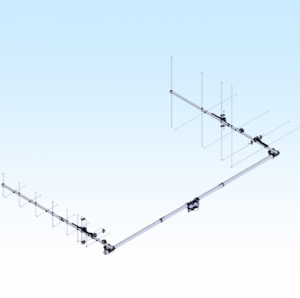
When you purchase through AMSAT, a portion of the proceeds goes towards
Keeping Amateur Radio in Space.
https://amsat.org/product-category/hardware/
SDRplay Announces the nRSP-ST Networked Receiver
SDRplay Limited has announced the imminent launch of the nRSP-ST, an all-in-one, plug-and-play networked SDR receiver. The nRSP-ST was demonstrated publicly for the first time at the UK National Hamfest this week.
(Editors Note: AMSAT News Service does not typically run new product announcements, but the nRSP-ST seems to provide satellite enthusiasts and operators with a radically new opportunity to deploy multiple stations to collect telemetry over wide-spread areas. This announcement does not constitute an endorsement by ANS.)
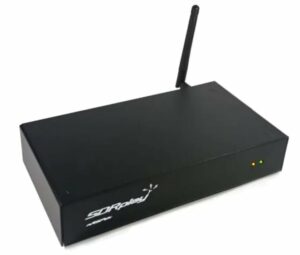
This SDR addresses the needs of radio enthusiasts who want a plug-and-play solution for remote reception. In addition to providing this functionality, SDRPlay claims to have addressed typical internet bandwidth limitations with the creation of a novel “IQ Lite” mode, which delivers channels of IQ data more efficiently. The device also introduces the ability to control and store IQ recordings at the remote location. SDRPlay thinks the nRSP-ST will be ideal for anyone wanting a wideband remote receiver without needing computer skills and hours of set-up time and ongoing maintenance at the remote location.
The nRSP-ST key features include:
- A truly “plug and play” integrated, networked general coverage receiver that combines a receiver, a host computer and other functionality in one box. Apply power and connect to the internet (Ethernet or Wi-Fi) and the nRSP-ST is automatically accessible.
- The 14-bit ADC full featured wideband SDR receiver covers all frequencies from 1kHz through VLF, LF, MW, HF, VHF, UHF and L-band to 2GHz with no gaps.
- Remotely monitoring of up to 10MHz of spectrum at a time from a choice of 3 antennas.
- Multi-platform SDRconnectTM software that supports local operation or remote access on Windows, MacOS or Linux platforms.
- Supports multiple client connections with a simultaneous mixture of connection modes.
- All modes support visualization of up to 10MHz spectrum bandwidth.
- Two remote connection options: use a remote SDRconnect client or use the built-in web-server for remote access from any web browsing capable device, including Android/iOS tablets and phones.
- The ability to record IQ and audio files to a NAS (network attached storage) device if available on the LAN.
- Flash upgradable for future feature enhancements.
- The nRSP-ST with SDRconnectTM is configurable for whatever network bandwidth is available:
- In “Full IQ” mode, the nRSP-ST provides IQ data transfer of the visible spectrum bandwidth (e.g.for high-speed LAN or superfast internet connectivity).
- In “IQ Lite” mode, the nRSP-ST provides IQ data of channels up to 192kHz wide (e.g. for digital decoding by the client).
- In “Compact” mode the nRSP-ST provides compressed audio (ideal for slower internet connections).
SDRPlay is aiming to launch the nRSP-ST in the Fall of 2024 with a price of under $500 USD. More information is available at https://tinyurl.com/ANS-280-nRSP-ST
[ANS thanks rtl-sdr.com for the above information.]
VUCC Satellite Standing October 2024
VUCC Satellite Award/Endorsement Change Summary for September 01, 2024 to October 01, 2024.
K8DP 1701 1737
WI7P 1078 1104
JK2XXK 1036 1086
JN2QCV 908 1016
EA2AA 982 1011
W8LR 859 887
JS1LQI 701 808
N8MR 731 755
KS1G 703 754
LY4AA 555 670
XE2YWH 118 595
W9FF 450 525
KO9A 472 524
VA3VGR 352 509
HP2VX 500 508
KA9CFD 283 500
N6PAZ 450 472
K4RGK 362 421
JE3HCZ 103 410
NJ2DX 365 404
K3HPA 300 350
SP7JS 207 253
RA0FF New 211
W2HRO New 192
DH0GSU 152 156
AE5AU 101 153
XE2YWH (DL82 – D 114 119
XE2YWH (DL82) 114 119
YC1RIK New 114
N5YIZ New 100
W4XP New 100
Congratulations to the new VUCC Satellite holders.
RA0FF is first VUCC Satellite holder from Asiatic Russia and QN16.
YC1RIK is first VUCC Satellite holder from OI33.
DXCC Satellite has still not been updated since May
[ANS thanks Jon Goering, N7AZ for the above information.]
Want to fly the colors on your own grid expedition?
Get your AMSAT car flag and other neat stuff from our Zazzle store!
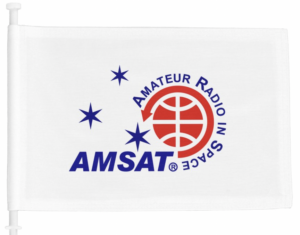
25% of the purchase price of each product goes towards
Keeping Amateur Radio in Space
https://www.zazzle.com/amsat_gear
Changes to AMSAT-NA TLE Distribution for October 4, 2024
Two Line Elements or TLEs, often referred to as Keplerian elements or keps in the amateur community, are the inputs to the SGP4 standard mathematical model of spacecraft orbits used by most amateur tracking programs. Weekly updates are completely adequate for most amateur satellites. TLE bulletin files are updated daily in the first hour of the UTC day. New bulletin files will be posted immediately after reliable elements become available for new amateur satellites. More information may be found at https://www.amsat.org/keplerian-elements-resources/.
The following satellite has been removed from this week’s AMSAT TLE distribution:
OreSat0 NORAD Cat ID 52017 Decayed from orbit on 29 September 2024.
MESAT1 has been redesignated as MO-122.
[ANS thanks Joe Fitzgerald, KM1P, AMSAT Orbital Elements Manager, for the above information.]
ARISS NEWS
Amateurs and others around the world may listen in on contacts between amateurs operating in schools and allowing students to interact with astronauts and cosmonauts aboard the International Space Station. The downlink frequency on which to listen is 145.800 MHz worldwide.

Upcoming Contacts
School No. 2, Veliky Ustyug, Russia direct via TBD.
The ISS callsign is presently scheduled to be RSØISS.
The scheduled crewmember is Ivan Vagner.
The ARISS mentor is RV3DR.
Contact is go for Sunday, October 6, 2024 at 10:50 UTC.
Sekolah Menengah Kebangsaan Agama (SMKA) Tengku Ampuan Hajjah Afzan Pahang, Jerantut, Malaysia, direct via 9M2RPN.
The ISS callsign is presently scheduled to be OR4ISS.
The scheduled crewmember is Sunita Williams, KD5PLB.
The ARISS mentor is Satoshi Yasuda, 7M3TJZ.
Contact is go for: Monday, October 7, 2024 at 11:58 UTC.
European School of Varese, Varese, Italy, direct via IQ2XH.
The ISS callsign is presently scheduled to be OR4ISS.
The scheduled crewmember is Sunita Williams, KD5PLB.
The ARISS mentor is Ferrario Gianpietro, IZ2GOJ.
Contact is go for: Friday, October 11, 2024 at 08:22 UTC.
Jaanimmarik Ilinniarvik School, Jaanimmarik Iliniavik, Kuujjuaq, QC, Canada, Telebridge via IK1SLD.
The ISS callsign is presently scheduled to be OR4ISS
The scheduled crewmember is Nick Hague, KG5TMV.
The ARISS mentor is Steven McFarlane, VE3TBD.
Contact is go for: Friday, October 11, 2024 at 13:13 UTC.
Greenville Jr HS, Greenville, IL, direct via AD9OV.
The ISS callsign is presently scheduled to be NA1SS.
The scheduled crewmember is Don Pettit, KD5MDT.
The ARISS mentor is Gordon Scannell, KD8COJ.
Contact is go for Friday, October 11, 2024 at 14:32 UTC.
The crossband repeater continues to be active (145.990 MHz up {PL 67} & 437.800 MHz down). If any crewmember is so inclined, all they have to do is pick up the microphone, raise the volume up, and talk on the crossband repeater. So give a listen, you just never know.
The packet system is also active (145.825 MHz up & down).
As always, if there is an EVA, a docking, or an undocking; the ARISS radios are turned off as part of the safety protocol.
Note, all times are approximate. It is recommended that you do your own orbital prediction or start listening about 10 minutes before the listed time.
The latest information on the operation mode can be found at https://www.ariss.org/current-status-of-iss-stations.html
The latest list of frequencies in use can be found at https://www.ariss.org/contact-the-iss.html
[ANS thanks Charlie Sufana, AJ9N, one of the ARISS operation team mentors for the above information.]
Upcoming Satellite Operations
No operations listed.
A growing number of satellite rovers are currently engaged in sharing their grid square activations on https://hams.at. By visiting the website, you gain easy access to comprehensive information about the operators responsible for activating specific grid squares. Additionally, you have the ability to assess the match score between yourself and a particular rover for a given pass, while also being able to identify the upcoming satellite passes that are accessible from your location.
[ANS thanks Ian Parsons, K5ZM, AMSAT Rover Page Manager, and Alex Ners, K6VHF, for the above information.]
AMSAT Ambassador Activities
AMSAT Ambassadors provide presentations, demonstrate communicating through amateur satellites, and host information tables at club meetings, hamfests, conventions, maker faires, and other events.
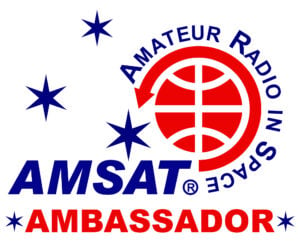
October 18-20, 2024
Pacificon 2024, ARRL Pacific Division Conference
San Ramon, CA
WUØI
October 25-27, 2004
AMSAT Space Symposium and Annual General Meeting
Double Tree Rocky Point Waterfront Hotel
Tampa Bay, FL
November 2-3, 2024
Stone Mountain Hamfest, ARRL State Convention
Stone Mountain, GA
https://stonemountainhamfest.com/
K4RGK
November 9, 2024
Oro Valley Amateur Radio Club
Marana Middle School
11285 West Grier Rd.
Marana, AZ 85653
https://www.tucsonhamradio.org/copy-of-hamfest-2022
N1UW
February 20-22, 2025
Yuma HAMCON
Yuma, AZ
N1UW
Interested in becoming an AMSAT Ambassador? AMSAT Ambassadors provide presentations, demonstrate communicating through amateur satellites, and host information tables at club meetings, hamfests, conventions, maker faires, and other events.
For more information go to: https://www.amsat.org/ambassador/
[ANS thanks Bo Lowrey, W4FCL, Director – AMSAT Ambassador Program for the above information.]
Satellite Shorts From All Over
- For those who missed the 2024 CubeSat Developers Workshop at Cal Poly San Luis Obispo, California last April, all recorded presentations are now available for viewing at https://www.youtube.com/@cubesat5793/streams. CPCL is Cal Poly’s CubeSat laboratory where the CubeSat standard originated, and where the CubeSat Design Specification is maintained and published. In addition to providing the CDS, CPCL hosts the annual CubeSat Developer’s Workshop in San Luis Obispo, and provides a central point for CubeSat community resources. [ANS thanks cubesat.org for the above information.]
- The 2025 SmallSat Conference is scheduled for August 11-13, 2025 at the Salt Palace Convention Center in Salt Lake City, Utah. The theme for the conference is Reaching New Horizons – New orbit. Same mission. Innovation and growing demand are driving the increased use of small satellites across a diverse global ecosystem. Both government and commercial sectors are pursuing proliferated networked constellations for global monitoring and connectivity. National space agencies and academia use small satellites for exploration, science, and fundamental research. The conference organizers have put out the first call for papers and for exhibitors. Abstracts are due by February 4 at 11:59 PM MT. More information is available at https://smallsat.org. [ANS thanks SmallSat.org for the above information.]
- SpaceX is pausing Falcon 9 launches again after the upper stage on the Crew-9 launch experienced an ‘off-nominal deorbit burn’ that led to missing its expected landing zone in the ocean—Crew-9, along with its two empty seats for stranded astronauts Williams and Wilmore, successfully reached the ISS without issue. [ANS thanks The Orbital Index for the above information.]
Join AMSAT today at https://launch.amsat.org/
In addition to regular membership, AMSAT offers membership to:
- Societies (a recognized group, clubs or organization).
- Primary and secondary school students are eligible for membership at one-half the standard yearly rate.
- Post-secondary school students enrolled in at least half time status shall be eligible for the student rate for a maximum of 6 post-secondary years in this status.
- Memberships are available for annual and lifetime terms.
Contact info [at] amsat [dot] org for additional membership information.
73 and remember to help Keep Amateur Radio in Space!
This week’s ANS Editor, Frank Karnauskas, N1UW
f.karnauskas [at] amsat [dot] org
